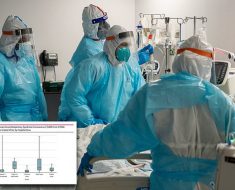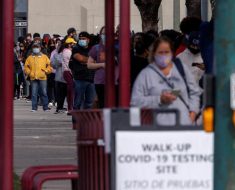
For many Californians venturing outside, donning a mask has become as common as putting on a cap or sunglasses but as the state begins easing stay-at-home orders on Friday the rules about face coverings still vary from county to county and enforcement generally is done through restaurant and store employees and social pressure.
Masks have been ubiquitous at essential businesses like grocery stores and medical clinics since the early days of the coronavirus pandemic. On the sidewalks of major cities like Los Angeles and San Francisco, people have been wearing masks for weeks, giving wide berth to the small number of others whose faces aren’t covered.
Now masks will be required for many employees at retailers reopening under new guidelines that call for curbside pickup and other methods of contact-free transactions, Gov. Gavin Newsom announced Thursday. Customers are strongly urged to wear face coverings.
At Sam’s, a corner store near San Francisco’s City Hall, multiple signs remind patrons to cover their faces, and the clerks have been known to kick out those who don’t follow the rules. Some customers simply lift their T-shirts over their nose and mouth while running in for a quick purchase.
Mayor London Breed said city residents must continue to wear face coverings and follow social distance requirements when waiting in line at newly reopened businesses like florists or bookstores.
Dannie Holzer said she wears a cloth mask most of the time but took it off while eating her lunch at nearby Alamo Square Park, where she was able to keep the required 6 feet (1.8 meters) from others.
“I wear it because I respect other people, and I don’t know what immune deficiencies they may have,” Holzer said. She got used to wearing masks because she rides public buses, where they are required, on her way to and from her job at a marijuana dispensary.
Holzer said she gets frustrated when sees people with their faces uncovered inside a store.
“I usually think, ‘I’m doing this for your benefit, so it would be nice if you did the same,’ ” Holzer said.
Health officials in most of the San Francisco Bay Area—including Alameda, Contra Costa, Marin, San Mateo and Sonoma counties—have required residents to wear masks when they leave their homes. After previously only strongly urging facing coverings, officials in nearby Napa County on Thursday said they would mandate them.
Bay Area residents are generally amenable to new rules instituted during the COVID-19 crisis, and deputies have issued very few citations for non-compliance, said Sgt. Ray Kelly of the Alameda County Sheriff’s Office.
“It’s really hard to write someone a ticket when they just lost their job, when they’re living through a time of crisis,” he said. “But if it’s egregious, and you’ve talked to yourself into a ticket, then we have no choice.”
Similarly in Los Angeles County, authorities hoped “kindness and compassion” would be enough to convince the “tiny group” of people who aren’t donning masks, Department of Public Health Director Dr. Barbara Ferrer said. She urged shop owners to politely refuse service to people without face coverings.
On trails around Los Angeles, county employees will be on hand to make sure hikers are wearing masks and maintaining appropriate distance, officials said.
To the south in Orange County, masks are recommended but not required. At a strip mall in the city of Westminster, a member of a grocery store cleaning crew had a mask dangling around her neck, not over her mouth and nose, as she offered a shopping cart to a man passing by on Thursday. He also had a mask dangling around his neck.
In Northern California, three counties with few confirmed COVID-19 cases allowed a variety of businesses to reopen and permitted restaurants to seat diners, defying the state’s stay-at-home order. Yuba Sutter Mall in Yuba City became the first mall to reopen in California on Wednesday and not all shoppers wore masks.
Yuba-Sutter Health Officer Dr. Phuong Luu issued a public warning to businesses in the two counties she oversees to make sure their employees and customers were practicing social distancing and wearing face coverings, as required by the local orders.
“I understand that some of your customers may strongly object to a facial covering requirement, but the long-term safety of our community is at stake,” Luu wrote.
The national Centers for Disease Control and Prevention recommends wearing face coverings such as non-medical masks or even T-shirts and bandannas to cover the nose and mouth, because the infection can spread from an asymptomatic person simply by speaking.
“A simple cloth mask is a way to contain respiratory secretions right at the source and not put other people at risk,” the CDC said in an April statement. “The mask traps the droplets before they spread into the environment.”
At the park in San Francisco, Dannie Holzer said while non-mask-wearers frustrate her, she stops short of calling people out. “I can’t be the person who tells people what to do,” she said.
Source: Read Full Article





